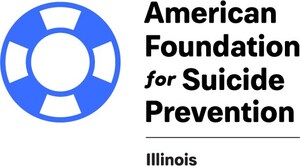Advocates to Storm Charleston to Demand Resources to Stop Suicide Among the Youth of West Virginia
CHARLESTON, W.Va., March 9, 2017 /PRNewswire-USNewswire/ -- West Virginia has one of the highest suicide rates in the United States, ranking 14th in the nation. To help prevent this tragic loss of life, volunteer advocates from the West Virginia chapter of the American Foundation for Suicide Prevention are visiting the state capitol on Friday, March 10th to encourage their legislative leaders to support legislation which would protect the state's youth: School Based Mental Health and Behavior Health Services (SB 251) and The Youth Mental Health Protection Act (SB 435). Legislators and the media are invited, from 8:30 a.m. to 10 a.m., in the second floor Rotunda of the House and Senate Chamber area, to meet with AFSP advocates to learn more about mental health and suicide prevention education and resources.
"After losing my brother Jamie to suicide at the age of 18, my own family learned the hard way (and a little too late) what the risk factors and warning signs are for someone who may be at risk for suicide," said Michelle Toman, Chair and Co-Founder of the West Virginia chapter of the American Foundation for Suicide Prevention. "In 1994, we had limited resources for help and support; I've been able to help change that as an advocate with AFSP. It is crucial moving forward for others to understand we CAN save lives if we know what to watch for and where to turn for help."
She continued, "In the year my brother should've turned 40 years old, we passed a law they named after him called Jamie's Law, HB 2535, which was adopted in 2015. It is incredible that over the course of the past two years while putting that legislation to work, we see those efforts making a difference. West Virginia moved from being 10th highest in the nation for youth and adolescent suicides (10- to 24 year-old age group) down to 37th in the nation ranking." Ms. Toman is part of a national movement of AFSP volunteer advocates who will be visiting 35 state capitols across the United States in spring 2017 to bring best practices in suicide prevention to state legislators. '
The Youth Mental Health Protection Act (SB 435)
If passed, this legislation will prohibit mental health professionals from engaging in conversion therapy with individuals under the age of 18. Sexual orientation conversion efforts are based on the belief that homosexuality is a mental illness that needs to be cured, a belief that has been rejected as scientifically invalid by the American Psychiatric Association and all other major mental health organizations. Conversion therapy has not been proven to change a person's sexual orientation, gender identity or expression. Conversion therapy can, however, invoke feelings of rejection, guilt, confusion, and shame and can lead to decreased self-esteem, substance abuse, social withdrawal, depression, anxiety, and increased risk for suicidal behavior; LGBT adolescents are at particular risk for emotional or physical harm.
When students do not feel marginalized by governmental policies, such as banning same sex marriage, their suicide attempt rate is lower. On February 20, there was a study published in the Journal of American Medicine which found that same-sex marriage policies were associated with a 7 percent reduction in the proportion of all high school students reporting a suicide attempt within the past year. The study analyzed pre- and post-policy rates of self-reported suicide attempts and found a decrease by 0.6 percentage points (8.6 percent to 8.0 percent) among the all-student group following policy implementation. For students identifying as sexual minorities, the reduction in suicide attempts was larger (28.5 percent to 24.5 percent).
School Based Mental Health and Behavior Health Services (SB 251)
If passed, SB 251 would create a three-year pilot program through the Department of Education to establish school-based mental and behavioral health services for students and families. This pilot will be available to schools who have implemented a school-based health center or an expanded school mental health framework. Through direct employment or contractual relationships, participating schools shall be required to provide mental health services, have services available for all tiers of need, and authorize those providing the services to receive referrals for students who violate the disciplinary code, provide mental or behavioral health assessments, and provide ongoing services to the student if necessary. Services would also be available to the student's family and household members.
The American Foundation for Suicide Prevention is dedicated to saving lives and bringing hope to those affected by suicide. AFSP creates a culture that's smart about mental health through education and community programs, develops suicide prevention through research and advocacy, and provides support for those affected by suicide. Led by CEO Robert Gebbia and headquartered in New York, AFSP has local chapters in all 50 states with programs and events nationwide. AFSP celebrates 30 years of service to the suicide prevention movement. Learn more about AFSP in its latest Annual Report, and join the conversation on suicide prevention by following AFSP on Facebook, Twitter, Instagram, and YouTube.
SOURCE American Foundation for Suicide Prevention
Related Links
WANT YOUR COMPANY'S NEWS FEATURED ON PRNEWSWIRE.COM?
Newsrooms &
Influencers
Digital Media
Outlets
Journalists
Opted In





Share this article